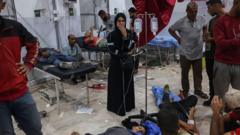The United Nations has denounced the humanitarian aid system in Gaza as a "death trap" following the deaths of at least 46 individuals due to Israeli gunfire in recent aid distribution incidents. Rescuers and hospitals in central and southern Gaza reported chaotic scenes as casualties poured into medical facilities overwhelmed with injuries. The UN's condemnation highlights the grave situation for civilians attempting to access food and aid amidst ongoing violence, emphasizing that the current aid distribution model is endangering lives rather than protecting them.
UN Criticizes Israeli Aid Distribution Amid Gaza Deaths

UN Criticizes Israeli Aid Distribution Amid Gaza Deaths
Grassroots organizations raise alarms over humanitarian conditions as UN condemns recent casualties from Israeli fire.
As the humanitarian crisis in Gaza intensifies, the UN is expressing grave concerns about a US and Israel-backed aid model, labeling it as fundamentally flawed. Recent reports indicate that at least 46 individuals have lost their lives in two alarming incidents, underscoring the precarious situation faced by those in desperate need of assistance.
Scenes at al-Awda hospital in Nuseirat revealed the devastating toll these incidents have taken, with men arriving with gunshot wounds, highlighting the very real dangers associated with seeking aid. One witness recounted how a father was shot while trying to collect food for his family, reflecting the tragic circumstances many families are encountering as they strive to feed their children.
The UN's humanitarian arms have voiced strong opposition to the current food distribution strategy, which they argue has turned into a "death trap" for civilians. A UN official called for accountability, urging that the weaponization of humanitarian aid constitutes a violation of international standards and could potentially amount to war crimes. The ongoing conflict has already seen over 410 civilians killed by Israeli actions in their pursuit of support and sustenance.
Reports from the ground indicate that the situation has degenerated into a near-daily occurrence, yet these tragic narratives often only gain fleeting attention. Rescuers and medical personnel are grappling with overwhelming casualties as individuals wait in line for food under the threat of crossfire.
Eyewitness accounts have detailed how Israeli forces opened fire on crowds gathered near food distribution points, leading to substantial injury and loss of life with little warning. In response to these tragic events, the Israel Defense Forces claimed they were responding to what they described as threats near their operational zones.
Despite a slight easing of the blockade, the situation for the people of Gaza remains dire, with reports of inadequate food supplies and widespread hunger. The Gaza Humanitarian Foundation, involved in aid distribution, has come under scrutiny for its ties to Israel while claiming to assist those in need. This link has raised concerns among many organizations, leading to warnings that the distribution approach undermines humanitarian principles.
As the plight of Gazans worsens, local families are facing desperate choices amidst fears of death. One father recounted that his family has been reduced to eating only bread and salt; he refrained from seeking aid due to the danger associated with the distribution centers, describing them as "death zones."
As international and local organizations strive to resolve these issues, humanitarian access and the protection of civilians in conflict zones remain critically urgent areas of concern in the ongoing Israel-Gaza conflict.























